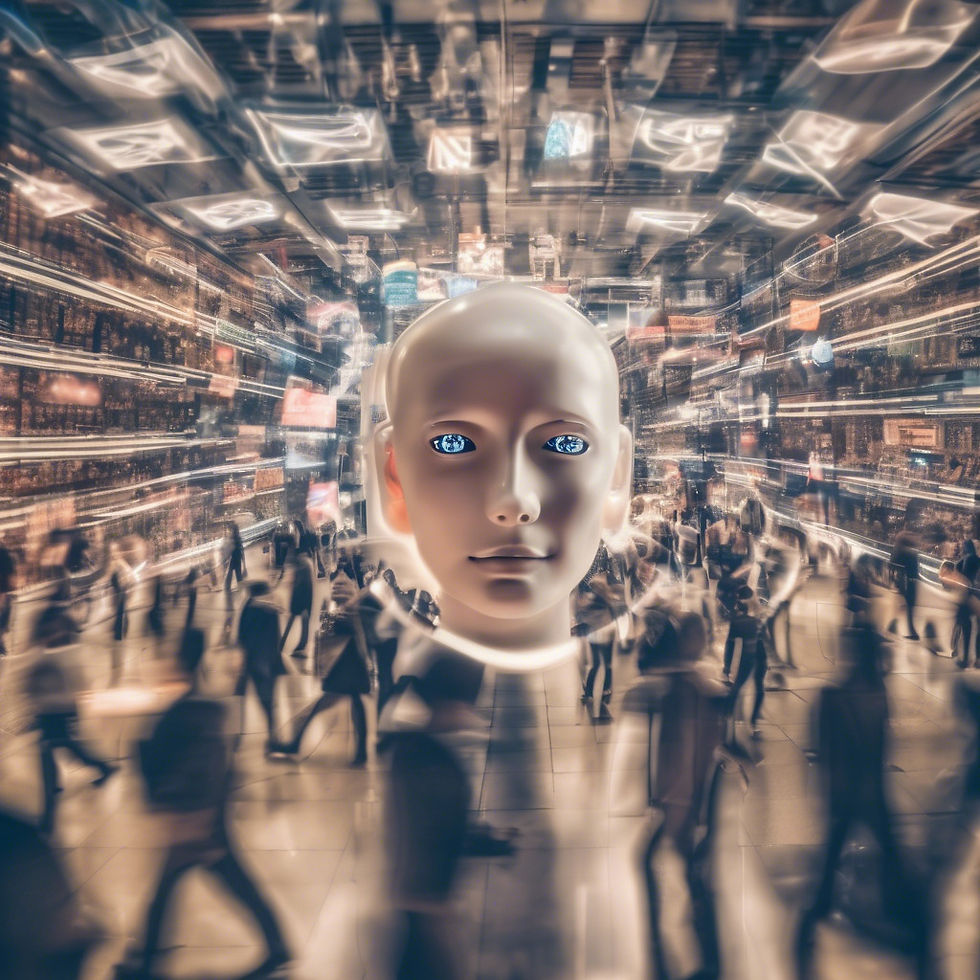Uncovering the Impact of AI Marketing: A New Frontier in the World of Advertising
- Emily Avakian

- Mar 27, 2025
- 4 min read

AI is changing the face of marketing in exciting ways. Today, businesses leverage artificial intelligence to connect with customers, streamline operations, and make smarter decisions quickly. From tailoring campaigns to predicting consumer behavior, AI's influence is undeniable. In this post, we’ll dive into how AI is reshaping marketing strategies and what that means for the future of advertising.
The Rise of AI in Marketing
AI technology has become a game-changer for marketers, prompting a wave of adoption across various industries. In fact, a survey by Salesforce showed that 84% of marketing teams believe AI will help them achieve their goals. With the amount of data generated every day—about 2.5 quintillion bytes according to IBM—the need for real-time analysis and actionable insights is essential. AI tools allow businesses to sift through this massive data and identify trends, which helps in making well-informed marketing decisions.
For example, brands like Coca-Cola and Netflix utilize AI algorithms to analyze consumer preferences effectively, unlocking new opportunities for campaign optimization. Learn More: "AI Marketing Masterclass"
Personalization Through AI
AI's ability to personalize experiences is one of its most remarkable features. For instance, 80% of consumers say they are more likely to make a purchase when brands offer personalized experiences. E-commerce sites, like Amazon, use AI for product recommendations, tailoring suggestions based on individual browsing and purchase histories. This personalized approach leads to a 29% increase in sales on average, as customers are more inclined to buy products that feel directly relevant to them.
Moreover, email campaigns transformed by AI not only address recipients by name but also curate content based on their past interactions. This kind of targeting can increase open rates by up to 26%.
Predictive Analytics: Preparing for the Future
Predictive analytics, enhanced by AI, allows marketers to forecast consumer behavior and trends. Businesses using predictive models can tailor their strategies proactively. For example, a retailer might notice via predictive analytics that sales for winter clothing drop significantly after a certain date. They can then implement strategies such as special promotions or targeted ads a month ahead to give themselves an edge.
According to McKinsey, companies that leverage predictive analytics can achieve a 10-20% increase in marketing effectiveness. Being proactive ensures businesses are prepared for market fluctuations without missing valuable opportunities.
Enhanced Customer Journey Mapping
Understanding how customers interact with brands at various touchpoints is crucial. AI helps marketers track and analyze these journeys, revealing key customer pain points. This data enables businesses to refine their messaging and engagement strategies to enhance the overall experience.
For example, companies like HubSpot utilize AI to create detailed customer journey maps, highlighting which stages generate the most conversions and where drop-offs occur. By targeting improvements in weak areas, some companies have reported a 20% increase in customer retention rates.

Automating Repetitive Tasks
By automating mundane tasks, AI allows marketers to focus on developing innovative strategies. Tasks such as social media management, data entry, and email segmentation can be efficiently handled by AI algorithms. For example, AI tools can schedule social media posts at peak engagement times, leading to a 30% boost in interactions on platforms such as Facebook and Instagram.
This automation not only saves time but also maintains a constant connection with audiences, ensuring that messages reach customers when they are most likely to engage.
Chatbots and Customer Service
Chatbots have become a staple in customer service, thanks to AI technology. These virtual agents can efficiently handle common inquiries, providing quick responses to customer questions. For example, 67% of consumers have used a chatbot for customer assistance in the past year. Companies like Sephora use AI-powered chatbots to guide customers through product selection and purchasing, resulting in improved satisfaction and reduced response times.
As AI capabilities grow, chatbots will continue to provide personalized experiences, understanding customer preferences and offering tailored recommendations.
Challenges and Considerations in AI Marketing
Despite its many advantages, AI marketing comes with challenges. One key concern is the ethical handling of consumer data. As marketers rely heavily on data to drive strategies, transparency must be a priority. According to a report from the International Association of Privacy Professionals, 86% of consumers are concerned about data privacy. Brands must find ways to balance data utilization with privacy considerations to maintain consumer trust.
Additionally, marketers need to ensure their AI tools are not unintentionally biased. Ensuring the fairness of algorithms can help build confidence among users and avoid potential backlash.
The Future of AI Marketing
As we look to the future, the potential of AI in marketing is vast. With advancements in technologies like natural language processing and machine learning, AI's role will only grow. Companies that can adapt and integrate these technologies will likely outperform competitors.
A report from Gartner indicates that by 2025, 80% of organizations will use AI to enhance their customer engagement strategies. The ability to engage consumers across various platforms seamlessly will set leading brands apart, ultimately fostering customer loyalty and driving revenue growth.

The Shift Towards AI-Driven Marketing
AI marketing is reshaping how brands interact with consumers and optimize their strategies. The benefits, such as enhanced personalization, predictive analytics, and improved customer journey mapping, are paving the way for more effective campaigns.
While concerns about data ethics and transparency persist, the advantages of adopting AI far outweigh the challenges. As companies continue to embrace AI marketing, they will not only increase efficiency but also foster better relationships with their customers.
The journey of leveraging AI in marketing is just beginning. Engaging with these technologies is crucial for businesses to stay competitive in an ever-evolving landscape. The future of marketing is bright, and those ready to innovate will thrive.
%20(500%20x%20300%20px).png)



great article to learn the basics of AI Marketing